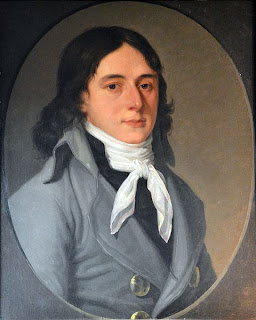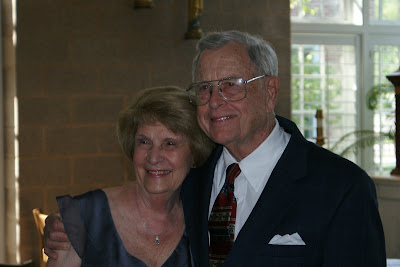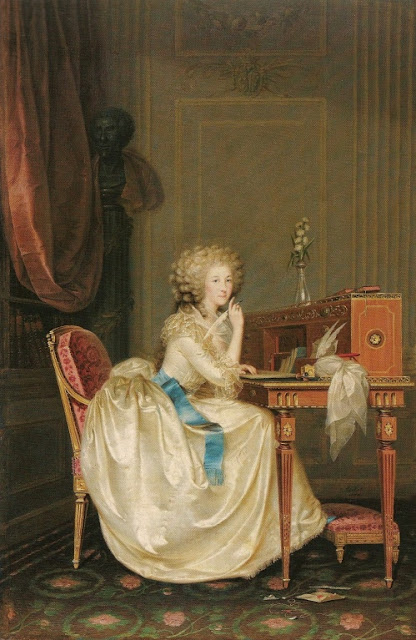Words and More Words
The face of leadership during the French Revolution was ever-changing. Some revolutionaries were well-meaning, idealistic, and, in light of the unfair system and poor living conditions of the common man, had valid reasons for wanting to up-end the system. Camille Desmoulins was, I think, one of those men. Vanity and pride in his writing and the success it brought him (Without the Revolution, he would've probably scratched out a meagre existence in obscurity.) sometimes led him to write words he dearly regretted.
The Revolution was too complicated for me to understand, much less communicate. So many factors influenced its path: events and pressure from within and without of the city of Paris/ events and pressure from émigrés in Coblentz, Belgium, England and elsewhere/ events and pressure from Prussia, Austria and other countries. Equally, or perhaps more importantly, because they interpreted and reacted to the events and pressures, were the personalities of the major players in Paris. I suppose that's obvious and is the case in each and every of life's situations. The personalities of those involved always affect the eventual outcome. Obvious, but endlessly compelling to me.
The French Revolution is an especially riveting example of the influence of the media on popular thought. The rivalries and competition between the various journalists had their sway as well.
The demise of a relatively moderate, reasonable group of insurgents, the Girondins, (most of whom, for example, supported the end of the monarchy, but not the death of the King) is an example of both the constant flux of leadership, the influence of personalities, and the effect of the pen.
The Girondins (also known as the Brissotins, making use of the name of a prominent member, Jean Pierre Brissot) decried the September Massacres which had been prompted by, among other things, the inflammatory writings of Marat and the incitement of Georges-Jacques Danton. The September Massacres led to public criticism, led by the Girondins, of Camille's friend, Danton. Danton, Robespierre, Marat and other radicals sought the downfall of their fellow, less-militant, revolutionaries, the Girondins.
By the way, it was this persecution, if it can be so-called, that inspired Girondin-supporter Charlotte Corday to murder Marat as he soaked in his medicinal bath.
Camille Desmoulins, influenced by the (older) men, particularly Robespierre, became enmeshed in a public war of words with the Girondin leader, Jean Pierre Brissot, which led to Camille writing and publishing the pamphlet, Histoire des Brissotins, accusing Brissot and the other Girondins (AKA Brissotins) of counterrevolutionary, treasonous activities. The backlash quickly led to the trial of the Girondins. When they were sentenced to death, a remorse-filled Desmoulins cried out "Oh, my God, oh, my God. It is I who have killed them!" as he collapsed in the courtroom.
Twenty-one Girondins (including one who was already dead, having committed suicide, I believe, in the courtroom after being sentenced) were beheaded, one after another, on Oct. 31, 1793. Several of the group had escaped Paris and were either hunted down or committed suicide, as in the case of Jean Roland, whose wife who wrote her memoirs, in prison, before being executed.
With the moderate Girondins out of the picture, the way was paved for the Reign of Terror. Danton and Camille eventually became disgusted with the mad downward spiral and called for it's end which, in turn, led to their confrontations with Robespierre, their trial, their execution.
To make a long story short... and, hopefully, factual! My point is… that it seems to me that Camille got carried away with his pride in his writing skills, was influenced by others, and was sometimes sorry he did.
The Revolution was too complicated for me to understand, much less communicate. So many factors influenced its path: events and pressure from within and without of the city of Paris/ events and pressure from émigrés in Coblentz, Belgium, England and elsewhere/ events and pressure from Prussia, Austria and other countries. Equally, or perhaps more importantly, because they interpreted and reacted to the events and pressures, were the personalities of the major players in Paris. I suppose that's obvious and is the case in each and every of life's situations. The personalities of those involved always affect the eventual outcome. Obvious, but endlessly compelling to me.
The French Revolution is an especially riveting example of the influence of the media on popular thought. The rivalries and competition between the various journalists had their sway as well.
The demise of a relatively moderate, reasonable group of insurgents, the Girondins, (most of whom, for example, supported the end of the monarchy, but not the death of the King) is an example of both the constant flux of leadership, the influence of personalities, and the effect of the pen.
The Girondins (also known as the Brissotins, making use of the name of a prominent member, Jean Pierre Brissot) decried the September Massacres which had been prompted by, among other things, the inflammatory writings of Marat and the incitement of Georges-Jacques Danton. The September Massacres led to public criticism, led by the Girondins, of Camille's friend, Danton. Danton, Robespierre, Marat and other radicals sought the downfall of their fellow, less-militant, revolutionaries, the Girondins.
By the way, it was this persecution, if it can be so-called, that inspired Girondin-supporter Charlotte Corday to murder Marat as he soaked in his medicinal bath.
Camille Desmoulins, influenced by the (older) men, particularly Robespierre, became enmeshed in a public war of words with the Girondin leader, Jean Pierre Brissot, which led to Camille writing and publishing the pamphlet, Histoire des Brissotins, accusing Brissot and the other Girondins (AKA Brissotins) of counterrevolutionary, treasonous activities. The backlash quickly led to the trial of the Girondins. When they were sentenced to death, a remorse-filled Desmoulins cried out "Oh, my God, oh, my God. It is I who have killed them!" as he collapsed in the courtroom.
Twenty-one Girondins (including one who was already dead, having committed suicide, I believe, in the courtroom after being sentenced) were beheaded, one after another, on Oct. 31, 1793. Several of the group had escaped Paris and were either hunted down or committed suicide, as in the case of Jean Roland, whose wife who wrote her memoirs, in prison, before being executed.
With the moderate Girondins out of the picture, the way was paved for the Reign of Terror. Danton and Camille eventually became disgusted with the mad downward spiral and called for it's end which, in turn, led to their confrontations with Robespierre, their trial, their execution.
To make a long story short... and, hopefully, factual! My point is… that it seems to me that Camille got carried away with his pride in his writing skills, was influenced by others, and was sometimes sorry he did.



Comments
These changes resulted from seemingly widely separated & unrelated factors, such as weather & superstition.
During all those years, I focused a great deal on Camille Desmoulins, primarily because he reminds me of me. There is an undeniable similarity of temperament, which I could not explain. Then, several years ago, I learned that I'm descended from him. My ancient ancestors were Salian Franks who founded France. From that point, Charlemagne was born; when you're descended from Charlemagne, your lineage surfaces reasonably quickly.
Many of my French ancestors were from Picardy, and particularly "de Guise." It's said that there are 2 types of Picards: the sober, Hobbit-ish kind & the wild & crazy kind. I am of the second type. So was Camille. At least I have an excuse now for being crazy!
If there are any questions I can answer for you, please feel free to let me know.
Sincerely,
Alix Long, Ph.D.
Memphis, TN
USA
I have a soft spot for Desmoulins. So much so, I think of him as Camille. I don't have any particular questions, but would welcome any information you'd like to share. I guess DNA is resilient and his traits have passed down to you.
I just got back from Paris. Writing on blog was like talking excitedly into a deep cavern and only getting an echo back, so I'd kind of quit. Your comment makes me want to get back to it. Come back soon.
It's been several years since you commented on my blog, but I re-read your comment today and regretted the fact that I was in Memphis recently and didn't remember your long ago words and, thus missed a chance to visit you and discuss. I hope you are well.